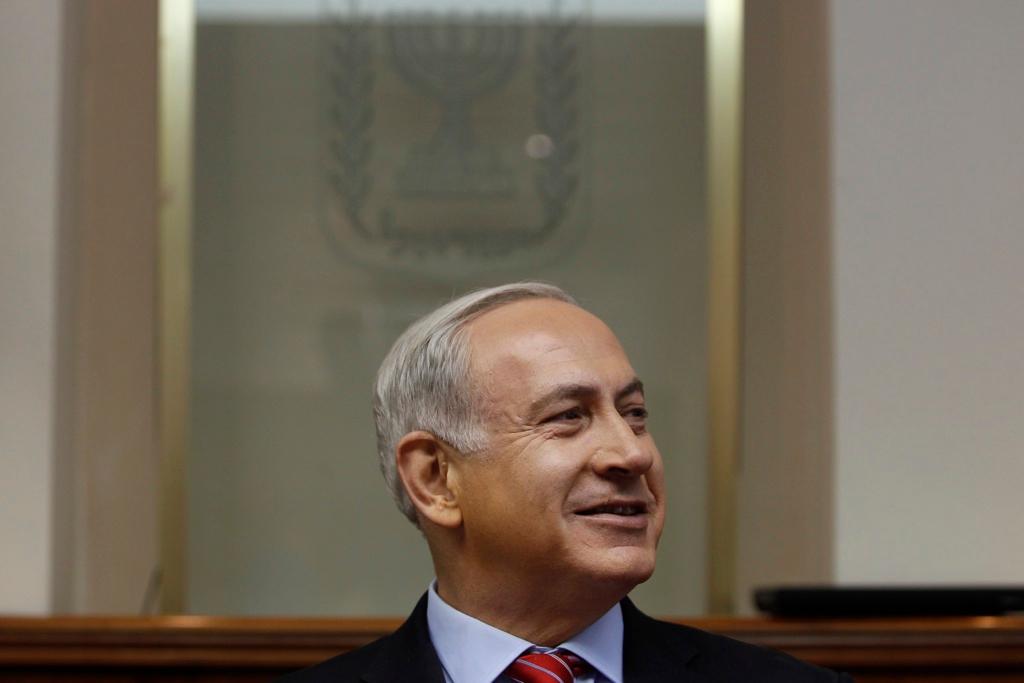In Israel, nervous energy ahead of Obama visit
Israeli Prime Minister Benjamin Netanyahu attends the weekly cabinet meeting at his offices on Sept. 2, 2012 in Jerusalem, Israel.
JERUSALEM — A month before US President Barack Obama's scheduled state visit, Israeli officials are already working overtime.
In a bit of mutual one-upmanship on Monday, the office of Prime Minister Benjamin Netanyahu unveiled an official name for the logistical arrangements surrounding the presidential visit and the office of the Israeli president, Shimon Peres, announced Obama will be the first sitting American president to be awarded Israel's Presidential Medal of Distinction.
Netanyahu, who designated the visit "Operation Unbreakable Alliance" (or, in slightly less breathy Hebrew, Covenant of Peoples), and who used his Facebook page to urge cyber citizens to vote on an official logo for the visit, was perceived to be engaging in a bit of clumsy overkill, betraying a hint of nervousness before the trip.
The general tittering about the name and the Facebook competition came on the heels of a weekend in which Netanyahu, who has often fumbled his public relations image, was caught with a state-sponsored personal ice cream consumption budget of almost $3,000.
The fraught Netanyahu-Obama relationship has been described as joyful as a "loveless marriage," and Israeli officials are working overtime to make sure this is a successful visit.
A month after elections in which Netanyahu's power was seriously eroded, he is still far from being able to form a new government. Israeli political analysts have started speculating that he will be unable to in the six weeks allotted to him. Netanyahu can request a two week extension, but some are going so far as to entertain the thought of new elections being called.
This Obama visit, if it goes well, could burnish Netanyahu's claim to be the only legitimate candidate for prime minister.
While it is common in many countries for logistical officers responsible for a state visit to bequeath "the operation" with a name, in Israel, this is normally done at random by a computer. And no state visit in memory, including that of other American presidents, has been branded with a logo.
One close observer, who requested to remain nameless, sighed deeply before saying, "As always, even when they have a good idea, they do it ridiculously. Instead of letting the computer decide, they went overboard as if they are shouting, 'We're best buddies! Best friends!'"
He added, "They think public participation is good."
Few Israelis doubt that. In fact, a Facebook page calling on Obama to give a "Speech for Peace" in Tel Aviv's Rabin Square has gotten more than 17,000 likes, though no response, as of yet, from the White House.
An official from the prime minister's office said the efforts are a way to harness the “energy” the visit has generated in Israel.
"The public is excited and I think the idea was to take a lot of that energy and try to get the public involved,” the official told GlobalPost. “The idea is to use new media to further that goal. Everything is transparent, everything is open for discussion, and people who don't think we're doing it right can say so."
Cynical or not, Israelis spent much of Monday doing just that.
For example, a former diplomat tweeted that the ailing Venezuelan president, Hugo Chavez, may just need Netanyahu's help in coming up with a logo to commemorate his repatriation from Cuba.
An official itinerary has yet to be released, but various leaked drafts reveal a schedule full of symbolic visits intended to transmit a message about Israel's history and right to exist, and about longstanding Jewish claims to the land of Canaan. One draft indicates his first stop could be to the Holocaust memorial, Yad Vashem, with a detour the next day to a new blockbuster exhibition at the Israel Museum called Herod the Great, the King's Final Journey, which details the life of the bloodthirsty but great Roman-Jewish King of ancient Judea.
While the acclaimed show has garnered stellar reviews, it is an unusual stop on a 48-hour presidential whirlwind tour, of which five hours will be spent in the Palestinian Territories.
It appears that the White House is angling for more serious policy coordination with Netanyahu on subjects as thorny as Iran's nuclear program and the moribund Israel-Palestine peace negotiations.
Netanyahu, who may not wish or be able to address those issues directly, especially if he is not at the helm of a stable governing coalition, seems inclined instead to follow the footsteps of his recently deceased father, a prominent and ideological historian of Jewish history, and review history.
Every day, reporters and producers at The World are hard at work bringing you human-centered news from across the globe. But we can’t do it without you. We need your support to ensure we can continue this work for another year.
Make a gift today, and you’ll help us unlock a matching gift of $67,000!
